evolution
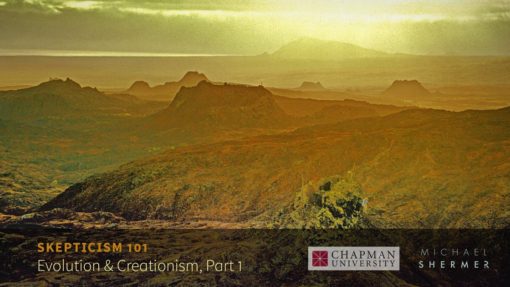
In this lecture on Evolution and Creationism (Part 1), Dr. Michael Shermer takes viewers to the Galápagos Islands to retrace Darwin’s footsteps and show that, in fact, Darwin did not discover natural selection when he was there in September of 1835. He worked out his theory when he returned home, and Shermer shows exactly how Darwin did that, along with the story of the theory’s co-discoverer, Alfred Russel Wallace.
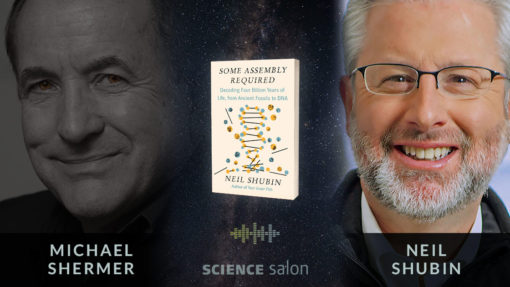
In Science Salon # 109 Michael Shermer speaks with Neil Shubin about his new book Some Assembly Required: Decoding Four Billion Years of Life, from Ancient Fossils to DNA — a lively and accessible account of the great transformations in the history of life on Earth.
In Science Salon # 109 Michael Shermer speaks with Neil Shubin about his new book Some Assembly Required: Decoding Four Billion Years of Life, from Ancient Fossils to DNA. PLUS Harriet Hall, M.D. reminds us that though many wines improve with age, human bodies don’t; we deteriorate.
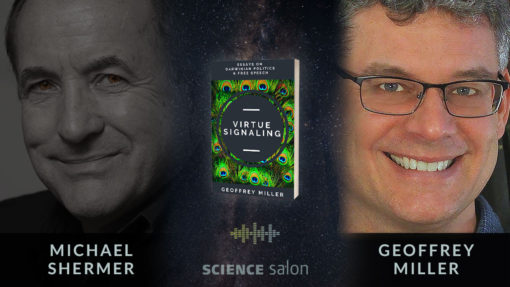
Shermer speaks with the polymathic polyamorous sapiosexual classically liberal evolutionary psychologist Geoffrey Miller about virtue signaling and why we all do it, how it works, why it’s not a bad thing, how it became a derogatory political meme, the role of virtue signaling in the evolution of the moral sentiments, and more…
In Science Salon # 93 Michael Shermer speaks with evolutionary psychology professor Geoffrey Miller about his book: Virtue Signaling: Essays on Darwinian Politics and Free Speech. Plus, Michel Jacques Gagné examines the reasons shocking events like the Kennedy assassination give rise to conspiracy myths.
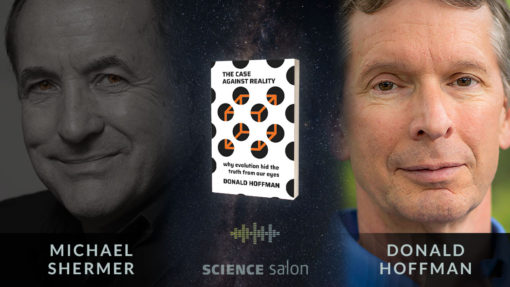
Cognitive scientist Dr. Donald Hoffman challenges the leading scientific theories that claim that our senses report back objective reality. How can it be possible that the world we see is not objective reality? And how can our senses be useful if they are not communicating the truth? Hoffman argues that while we should take our perceptions seriously, we should not take them literally.
In Science Salon # 78, Michael Shermer speaks with cognitive scientist Dr. Donald Hoffman about his new book The Case Against Reality: Why Evolution Hid the Truth From Our Eyes, which challenges the leading scientific theories that claim that our senses report back objective reality. Plus, Harriet Hall M.D. examines whether laser therapy is more hype than hope.

In Science Salon # 68, Lucyle T. Werkmeister Professor of Philosophy Dr. Michael Ruse discusses A Darwinian Meaning to Life; PLUS Harriet Hall, M.D. expresses concerns that under the right-to-try law, patients may not fully understand the risks and the low probability of success, and drug companies may take advantage to sell their products to desperate individuals at inflated prices.
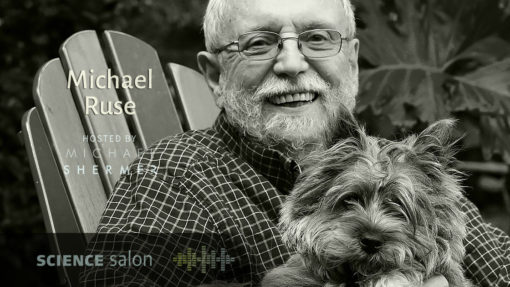
Shermer and Ruse discuss Ruse’s early life growing up as a Quaker in England and how this influenced his thinking about religion • why he is a bulldog against creationism but has a soft spot in his heart for religion • why we should not read religious texts literally, but allegorically • his beef with the New Atheists • how Darwinism is a religion, and more…
VeriSign founder David Cowan avers that science is the key to combatting the spread of disinformation; PLUS, evolutionary anthropologist Michael Tomasello presents his new theory of how humans became such a distinctive species.
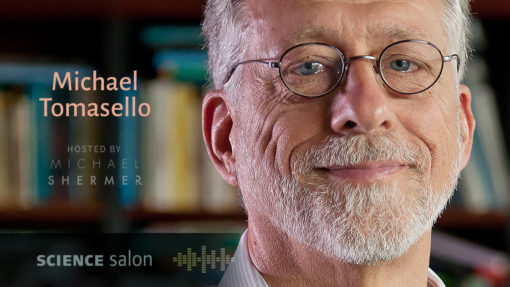
In this fascinating conversation with the evolutionary anthropologist Michael Tomasello, the Max Planck Institute scientist presents his new theory of how humans became such a distinctive species.
In Science Salon # 63, through the lens of evolutionary science, Dr. Hector A. Garcia offers a novel perspective on why we hold our political ideas, and why they are so often in conflict. Drawing on examples from across the animal kingdom, Garcia reveals how even the most complex political processes can be influenced by our basic drives to survive and reproduce.
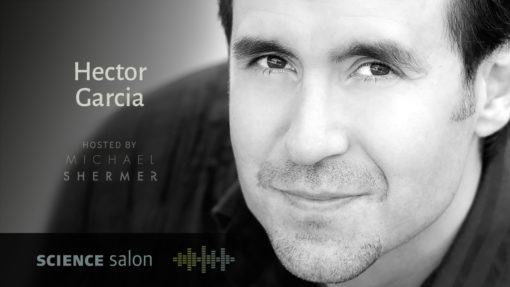
In Science Salon # 63, through the lens of evolutionary science, Dr. Hector A. Garcia offers a novel perspective on why we hold our political ideas, and why they are so often in conflict. Drawing on examples from across the animal kingdom, Garcia reveals how even the most complex political processes can be influenced by our basic drives to survive and reproduce.
In this fascinating dialogue, Dr. Michael Shermer speaks with biological anthropologist Dr. Richard Wrangham about the evolutionary histories of reactive and proactive aggression as theorized in his book The Goodness Paradox: The Strange Relationship Between Virtue and Violence in Human Evolution.
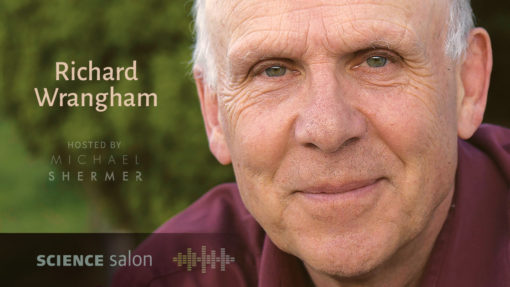
Richard Wrangham offers a startlingly original theory of how, in the last 250 million years, humankind became an increasingly peaceful species in daily interactions even as its capacity for coolly planned and devastating violence remains undiminished. In tracing the evolutionary histories of reactive and proactive aggression, biological anthropologist Richard Wrangham forcefully and persuasively argues for the necessity of social tolerance and the control of savage divisiveness still haunting us today.
In Science Salon # 60 — exceptionally important conversation — Dr. Shermer discusses at length the background to and research of Dr. Nicholas Christakis, a physician and evolutionary sociologist famous for his study of social networks in humans and other animals. PLUS: The breadth of what can be meant by the word “hoax” makes the concept — and consequences — worthy of renewed study. Michelle E. Ainsworth reviews Bunk: The Rise of Hoaxes, Humbug, Plagiarists, Phonies, Post-Facts, and Fake News…
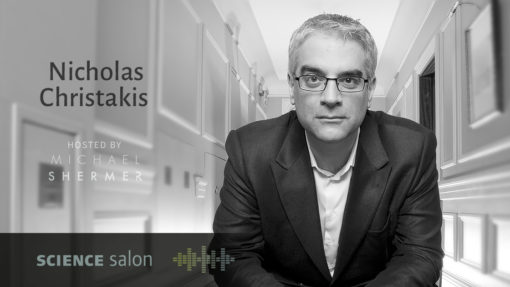
In Science Salon # 60 — an exceptionally important conversation — Dr. Shermer discusses at length the background to and research of Dr. Nicholas Christakis, a physician and evolutionary sociologist famous for his study of social networks in humans and other animals.
In Science Salon # 57, Dr. Shermer speaks with legendary biologist and primatologist Dr. Frans de Waal about his empirical and theoretical work on animal societies, politics, intelligence, sentience, consciousness and, now, feelings and emotions. PLUS, using two cases as touchstones, Stewart Justman draws an analogy between the extraction of an apology and the extraction of a false confession to a crime of violence.
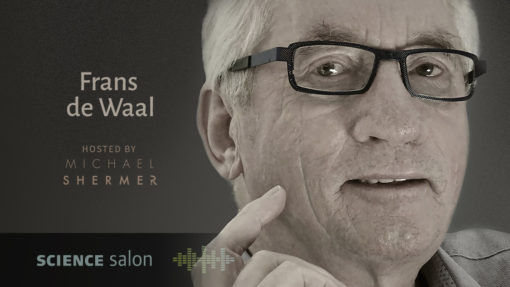
In Science Salon # 57, Dr. Shermer speaks with legendary biologist and primatologist Dr. Frans de Waal about his empirical and theoretical work on animal societies, politics, intelligence, sentience, consciousness and, now, feelings and emotions. His latest book is called Mama’s Last Hug: Animal Emotions and What They Tell Us about Ourselves.
In this eSkeptic: Science Salon # 56: Dr. Tyler Cowen — How an Economist Views the World; Announcing Skeptic Magazine 24.1, Available Now in Print & Digital Editions; Behe’s Last Stand: The Lion of Intelligent Design Roars Again.
← PREVIOUS
NEXT →





















